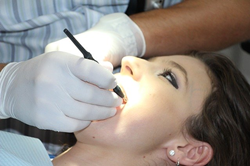
Discuss your options with your dentist before a procedure so that you will arrive fully prepared for your appointment.
PASO ROBLES, Calif. (PRWEB)
July 07, 2020
Fear of pain is one of the leading reasons people stay away from the dentist. Paso Robles dentist, Dr. Lisa Lu Davis, who offers painless dental care, said, “There are a number of medications available these days to make patients more relaxed and comfortable, encouraging them to take better care of their teeth.”
The American Dental Association (ADA) reports that the medications available for painless dental care include a range of safe treatments from simple relaxation to a deep sleep, depending on the type of procedure.
“Neglecting regular dental care can lead to tooth decay, gum disease and tooth loss,” said Davis. “Poor oral health effects our overall health as well. We are very happy to offer patients the support they need to encourage them to take care of their oral health.”
The the type of medication available depends on the procedure and other important factors such as the patient’s age, overall health, allergies and level of anxiety. “Discuss your options with your dentist before a procedure so that you will arrive fully prepared for your appointment,” said Davis.
The choices for sedation are:
- Minimal sedation during which the patient is awake, but feeling calm
- Moderate when the patient is awake but not fully aware
- Deep sedation when the patient is awake but with minimal consciousness
- General anesthesia when the patient is completely unconscious
Each of these levels of sedation reduce anxiety and help numb the patient to pain during the procedure. Obviously, certain levels of sedation are more appropriate for certain procedures —general anesthesia, for example, is much more appropriate for oral surgery than it would be for fillings.
How the sedation is administered also depends on the level of sedation:
- “Laughing gas,” – nitrous oxide – is administered through a breathing mask and the patient will likely be fully functional following the procedure, including able to drive.
- Oral sedation is administered through a pill and patients are groggy, often falling asleep during the procedure.
- IV sedation is administered through an IV drip and takes effect almost immediately.
Pain relief after a procedure is sometimes necessary. Medicine used to relieve pain can range from aspirin to a prescription for a pain-relieving narcotic. Just as the level of sedation depends on the procedure, so does the type of pain medication.
The Paso Robles dentist encourages everyone to feel free to ask their dentist as many questions as needed. The topics to cover with your dentist before scheduling a procedure during which you will be sedated include:
- Information about what happens during the procedure, including about how long it will take.
- What to expect after the procedure in terms of care such as brushing, flossing, rinsing, eating and drinking, care of stitches
- Which sedation level is the most appropriate for you and the procedure
- What to expect during sedation
- What to expect when recovering from sedation
- Will you need someone to drive you home? Will you need someone to help once you get home?
- What kind of pain relief care is appropriate during recovery and where the office should call in any prescription
The ADA reports that dentists treat millions of patients safely every year, and both the ADA and Dr. Davis encourage patients to take an active role in their oral health. Working with your dentist, the two of you can create a visit that is as safe and comfortable as possible.
Lisa Lu Davis DMD has provided personalized dental care to thousands of families and uses state-of-the-art technologies in all procedures. These new technologies allow Dr. Davis to detect dental concerns at early stages, treat dental issues with precision, and provide stunning and customized restorations.
Lisa Lu Davis, DMD, Inc
2120 Golden Hill Road, Suite 103
Paso Robles, CA 93446
(805) 238-6777
Share article on social media or email:

